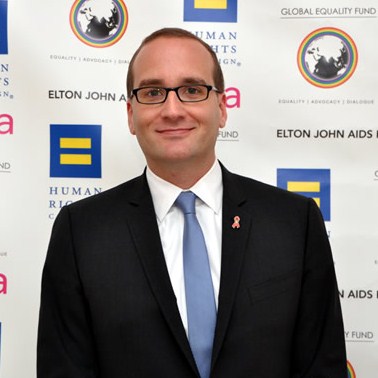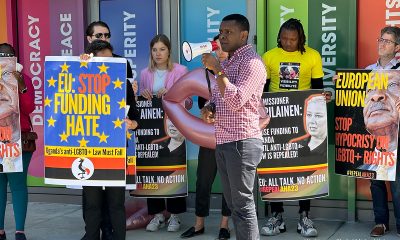National
HRC joins calls for agreement to avoid ‘fiscal cliff’
ADAP waiting lists, loss of funds for LGBT centers among issues cited


HRC President Chad Griffin is among those calling for a plan to avert the ‘fiscal cliff.’ (Blade file photo by Michael Key)
The Human Rights Campaign is becoming active in the effort to avert the “fiscal cliff” crisis following a White House meeting President Obama convened with the LGBT organization and other civic groups.
Last week, HRC launched a campaign highlighting how the LGBT community would be negatively affected by the upcoming “fiscal cliff” — a colloquial term used for the time when various tax cuts would expire and massive budget cuts would befall U.S. government programs under the Budget Control Act.
HRC details several reasons why sequestration under the Budget Control Act — legislation signed by Obama as part of a deal to raise the nation’s debt ceiling — would be detrimental unless Congress agrees to an alternate plan.
Among the issues affecting LGBT people cited by HRC:
• nearly 10,000 low-income people will lose access to life-saving medicines under AIDS Drug Assistance Programs;
• hundreds of millions of dollars will be taken from federal programs providing treatment and housing to people with HIV/AIDS;
• cuts could interfere with the investigation and prosecution of hate crimes, including those against LGBT people;
• and funds for long-sought programs like the National LGBT Aging Resource Center and the LGBT Refugee Resource Center could be reduced — if not cut entirely.
In addition to pledging to inform its members about the consequences of the “fiscal cliff” through blog posts and social media, HRC has an online letter that supporters can sign to ask their representatives in Congress to come to an agreement.
But the “fiscal cliff” is about more than just the sequester. At the same time that these budget cuts are instituted, tax cuts signed into law by former President George W. Bush will expire as well as payroll tax cuts extended last year. President Obama campaigned on allowing the high-end tax cuts for those making more than $250,000 a year to expire as a means of generating more revenue to reduce the deficit.
The Washington Blade reported in October that doing nothing about the “fiscal cliff” could result in devastating cuts for HIV/AIDS programs and other federally funded initiatives affecting the LGBT community. According to a report from the Senate Health, Education, Labor & Pensions Committee, as many as 12,219 people receiving drugs from ADAP would lose access to medicine.
Chad Griffin, HRC’s president, underscored the importance of coming together around a plan — a not-so-easy task considering different parties control each chamber of Congress.
“Programs designed to serve the most vulnerable Americans, including LGBT people, are on the brink of annihilation if Congress doesn’t get its act together,” Griffin said. “Sequestration would take away vital lifelines that so many in our community rely on to get by — many even to live.”
The announcement from HRC about its new campaign came on the same day Griffin took part in a White House meeting on the “fiscal cliff” with Obama and Vice President Joe Biden as part of a group of 13 civic leaders. Others set to attend were Wade Henderson, president of the Leadership Conference on Civil Rights; Ben Jealous, president of the NAACP; and Rev. Al Sharpton.
Fred Sainz, HRC’s vice president of communications, said LGBT issues unrelated to the “fiscal cliff” were not brought up by Griffin.
“The president convened the various heads of organizations … and during that meeting, obviously, there was a discussion by the president and folks that were there about the implications of the road ahead on the communities affected,” Sainz said.
The discussion took place after another bipartisan meeting earlier in the day with Obama, Biden and congressional leaders: House Speaker John Boehner (R-Ohio), House Minority Leader Nancy Pelosi (D-Calif.), Senate Majority Leader Harry Reid (D-Nev.) and Senate Minority Leader Mitch McConnell (R-Ky.).
It’s not the first time HRC has launched a campaign for an initiative that has broader implications beyond the LGBT community. But Sainz said each position the organization takes is in some way related to LGBT issues.
For example, HRC has a pro-choice position because the right to privacy affects LGBT legal issues and it supports the Employee Free Choice Act, a bill that would streamline the unionization process, because it would allow for collective bargaining to ensure protections for LGBT employees.
HRC has also supported the health care reform law. Components of that measure specifically impact the LGBT community, such as non-discrimination protections in health care and allowing data collection in federal health surveys for the LGBT community.
“There is always an LGBT component when we weigh in on any initiative — though it might not be as obvious or direct as the Employment Non-Discrimination Act, “Don’t Ask, Don’t Tell” repeal, etc.,” Sainz said.
Richard Grenell, a gay conservative pundit who briefly served as a spokesperson for the Mitt Romney presidential campaign, nonetheless said the “fiscal cliff” initiative demonstrates Griffin is taking HRC away from its intended mission.
“The revelation that HRC is working with some of the country’s most vocal tax and spend advocates to help the White House raise taxes is clearly a decision by Chad to move HRC from a gay civil rights organization to a broadly liberal activist one,” Grenell said. “It may be exactly what the board brought Chad in to do, but aligning gay rights with a partisan agenda relegates our issues to further partisan games.”
State Department
State Department releases annual human rights report
Antony Blinken reiterates criticism of Uganda’s Anti-Homosexuality Act

Secretary of State Antony Blinken on Monday once again reiterated his criticism of Uganda’s Anti-Homosexuality Act upon release of the State Department’s annual human rights report.
“This year’s report also captures human rights abuses against members of vulnerable communities,” he told reporters. “In Afghanistan, the Taliban have limited work opportunities for women, shuttered institutions found educating girls, and increasing floggings for women and men accused of, quote, ‘immoral behavior,’ end quote. Uganda passed a draconian and discriminatory Anti-Homosexuality Act, threatening LGBTQI+ individuals with life imprisonment, even death, simply for being with the person they loved.”
Ugandan President Yoweri Museveni last May signed the law, which contains a death penalty provision for “aggravated homosexuality.”
The U.S. subsequently imposed visa restrictions on Ugandan officials and removed the country from a program that allows sub-Saharan African countries to trade duty-free with the U.S. The World Bank Group also announced the suspension of new loans to Uganda.
Uganda’s Constitutional Court earlier this month refused to “nullify the Anti-Homosexuality Act in its totality.” More than a dozen Ugandan LGBTQ activists have appealed the ruling.
Clare Byarugaba of Chapter Four Uganda, a Ugandan LGBTQ rights group, on Monday met with National Security Council Chief-of-Staff Curtis Ried. Jay Gilliam, the senior LGBTQI+ coordinator for the U.S. Agency for International Development, in February traveled to Uganda and met with LGBTQ activists who discussed the Anti-Homosexuality Act’s impact.
“LGBTQI+ activists reported police arrested numerous individuals on the basis of their sexual orientation or gender identity and subjected many to forced anal exams, a medically discredited practice with no evidentiary value that was considered a form of cruel, inhuman, and degrading treatment and could amount to torture,” reads the human rights report.
The report, among other things, also notes Ugandan human rights activists “reported numerous instances of state and non-state actor violence and harassment against LGBTQI+ persons and noted authorities did not adequately investigate the cases.”
Report highlights anti-LGBTQ crackdowns in Ghana, Hungary, Russia
Ghanaian lawmakers on Feb. 28 approved the Promotion of Proper Human Sexual Rights and Ghanaian Family Values Bill. The country’s president, Nana Akufo-Addo, has said he will not sign the measure until the Ghanaian Supreme Court rules on whether it is constitutional or not.
The human rights report notes “laws criminalizing consensual same-sex sexual conduct between adults” and “crimes involving violence or threats of violence targeting lesbian, gay, bisexual, transgender, queer or intersex persons” are among the “significant human rights issues” in Ghana.
The report documents Hungarian Prime Minister Viktor Orbán and members of his right-wing Fidesz party’s continued rhetoric against “gender ideology.” It also notes Russia’s ongoing crackdown against LGBTQ people that includes reports of “state actors committed violence against LGBTQI+ individuals based on their sexual orientation or gender identity, particularly in Chechnya.”
The report specifically notes Russian President Vladimir Putin on July 24 signed a law that bans “legal gender recognition, medical interventions aimed at changing the sex of a person, and gender-affirming care.” It also points out Papua New Guinea is among the countries in which consensual same-sex sexual relations remain criminalized.

The Cook Islands and Mauritius in decriminalized homosexuality in 2023.
The report notes the Namibia Supreme Court last May ruled the country must recognize same-sex marriages legally performed outside the country. The report also highlights the Indian Supreme Court’s ruling against marriage equality that it issued last October. (It later announced it would consider an appeal of the decision.)
Congress requires the State Department to release a human rights report each year.
The Biden-Harris administration in 2021 released a memorandum that committed the U.S. to promoting LGBTQ+ and intersex rights abroad.
The full report can be read here.
National
Same-sex couples vulnerable to adverse effects of climate change
Williams Institute report based on Census, federal agencies

A new report by the Williams Institute at the UCLA School of Law finds that same-sex couples are at greater risk of experiencing the adverse effects of climate change compared to different-sex couples.
LGBTQ people in same-sex couple households disproportionately live in coastal areas and cities and areas with poorer infrastructure and less access to resources, making them more vulnerable to climate hazards.
Using U.S. Census data and climate risk assessment data from NASA and the Federal Emergency Management Agency, researchers conducted a geographic analysis to assess the climate risk impacting same-sex couples. NASA’s risk assessment focuses on changes to meteorological patterns, infrastructure and built environment, and the presence of at-risk populations. FEMA’s assessment focuses on changes in the occurrence of severe weather events, accounting for at-risk populations, the availability of services, and access to resources.
Results show counties with a higher proportion of same-sex couples are, on average, at increased risk from environmental, infrastructure, and social vulnerabilities due to climate change.
“Given the disparate impact of climate change on LGBTQ populations, climate change policies, including disaster preparedness, response, and recovery plans, must address the specific needs and vulnerabilities facing LGBTQ people,” said study co-author Ari Shaw, senior fellow and director of international programs at the Williams Institute. “Policies should focus on mitigating discriminatory housing and urban development practices, making shelters safe spaces for LGBT people, and ensuring that relief aid reaches displaced LGBTQ individuals and families.”
“Factors underlying the geographic vulnerability are crucial to understanding why same-sex couples are threatened by climate change and whether the findings in our study apply to the broader LGBTQ population,” said study co-author Lindsay Mahowald, research data analyst at the Williams Institute. “More research is needed to examine how disparities in housing, employment, and health care among LGBT people compound the geographic vulnerabilities to climate change.”
Read the report
Federal Government
Lambda Legal praises Biden-Harris administration’s finalized Title IX regulations
New rules to take effect Aug. 1

The Biden-Harris administration’s revised Title IX policy “protects LGBTQ+ students from discrimination and other abuse,” Lambda Legal said in a statement praising the U.S. Department of Education’s issuance of the final rule on Friday.
Slated to take effect on Aug. 1, the new regulations constitute an expansion of the 1972 Title IX civil rights law, which prohibits sex-based discrimination in education programs that receive federal funding.
Pursuant to the U.S. Supreme Court’s ruling in the landmark 2020 Bostock v. Clayton County case, the department’s revised policy clarifies that discrimination on the basis of sexual orientation and gender identity constitutes sex-based discrimination as defined under the law.
“These regulations make it crystal clear that everyone can access schools that are safe, welcoming and that respect their rights,” Education Secretary Miguel Cardona said during a call with reporters on Thursday.
While the new rule does not provide guidance on whether schools must allow transgender students to play on sports teams corresponding with their gender identity to comply with Title IX, the question is addressed in a separate rule proposed by the agency in April.
The administration’s new policy also reverses some Trump-era Title IX rules governing how schools must respond to reports of sexual harassment and sexual assault, which were widely seen as imbalanced in favor of the accused.
Jennifer Klein, the director of the White House Gender Policy Council, said during Thursday’s call that the department sought to strike a balance with respect to these issues, “reaffirming our longstanding commitment to fundamental fairness.”
“We applaud the Biden administration’s action to rescind the legally unsound, cruel, and dangerous sexual harassment and assault rule of the previous administration,” Lambda Legal Nonbinary and Transgender Rights Project Director Sasha Buchert said in the group’s statement on Friday.
“Today’s rule instead appropriately underscores that Title IX’s civil rights protections clearly cover LGBTQ+ students, as well as survivors and pregnant and parenting students across race and gender identity,” she said. “Schools must be places where students can learn and thrive free of harassment, discrimination, and other abuse.”
-

 South America3 days ago
South America3 days agoDaniel Zamudio murderer’s parole request denied
-

 Maryland4 days ago
Maryland4 days agoMontgomery County police chief discusses arrest of trans student charged with planned school shooting
-

 Commentary4 days ago
Commentary4 days agoWorld ‘isn’t much different today’
-

 European Union5 days ago
European Union5 days agoActivists demand EU sanction Uganda over Anti-Homosexuality Act












